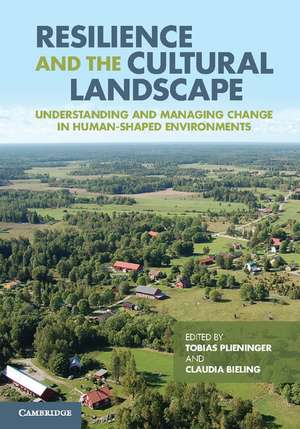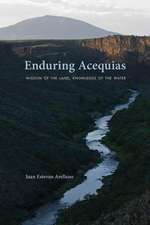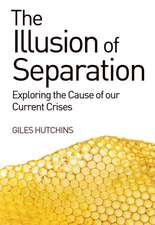Resilience and the Cultural Landscape: Understanding and Managing Change in Human-Shaped Environments
Editat de Tobias Plieninger, Claudia Bielingen Limba Engleză Hardback – 17 oct 2012
Preț: 557.16 lei
Preț vechi: 626.02 lei
-11% Nou
Puncte Express: 836
Preț estimativ în valută:
106.62€ • 111.82$ • 88.75£
106.62€ • 111.82$ • 88.75£
Carte tipărită la comandă
Livrare economică 01-15 aprilie
Preluare comenzi: 021 569.72.76
Specificații
ISBN-13: 9781107020788
ISBN-10: 1107020786
Pagini: 366
Ilustrații: 68 b/w illus. 13 tables
Dimensiuni: 181 x 253 x 23 mm
Greutate: 0.89 kg
Ediția:New.
Editura: Cambridge University Press
Colecția Cambridge University Press
Locul publicării:New York, United States
ISBN-10: 1107020786
Pagini: 366
Ilustrații: 68 b/w illus. 13 tables
Dimensiuni: 181 x 253 x 23 mm
Greutate: 0.89 kg
Ediția:New.
Editura: Cambridge University Press
Colecția Cambridge University Press
Locul publicării:New York, United States
Cuprins
Preface; 1. Connecting cultural landscapes to resilience Tobias Plieninger and Claudia Bieling; Part I. Conceptualising Landscapes and Social-Ecological Systems: 2. Landscapes as integrating frameworks for human, environmental and policy processes Paul Selman; 3. From cultural landscapes to resilient social-ecological systems: transformation of a classical paradigm or a novel approach? Thomas Kirchhoff, Fridolin Brand and Deborah Hoheisel; 4. Conceptualising the human in cultural landscapes and resilience thinking Lesley Head; 5. System or arena? Conceptual concerns around the analysis of landscape dynamics Marie Stenseke, Regina Lindborg, Annika Dhalberg and Elin Slätmo; 6. Resilience thinking vs. political ecology: understanding the dynamics of small-scale, labour-intensive farming landscapes Mats Widgren; Part II. Analysing Landscape Resilience: 7. In search of resilient behaviour: using the driving forces framework to study cultural landscapes Matthias Bürgi, Felix Kienast and Anna M. Hersperger; 8. Cultural landscapes as complex adaptive systems: the cases of northern Spain and northern Argentina Alejandro J. Rescia, María E. Pérez-Corona, Paula Arribas-Ureña and John W. Dover; 9. Linking path dependency and resilience for the analysis of landscape development Andreas Röhring and Ludger Gailing; 10. The sugar-cane landscape of the Caribbean islands: resilience, adaptation and transformation of the plantation social-ecological system William Found and Marta Berbés-Blázquez; 11. Offshore wind farming on Germany's North Sea coast: tracing regime shifts across scales Kira Gee and Benjamin Burkhard; Part III. Managing Landscapes for Resilience: 12. Collective efforts to manage cultural landscapes for resilience Katrin Prager; 13. Response strategy assessment: a tool for evaluating resilience for the management of social-ecological systems Magnus Tuvendal and Thomas Elmqvist; 14. Ecosystem services and social-ecological resilience in transhumance cultural landscapes: learning from the past, looking for a future Elisa Oteros-Rozas, José A. González, Berta Martín-López, César A. López and Carlos Montes; 15. The role of homegardens in strengthening social-ecological resilience: case studies from Cuba and Austria Christine Van der Stege, Brigitte Vogl-Lukasser and Christian R. Vogl; 16. Promises and pitfalls of adaptive management in resilience thinking: the lens of political ecology Betsy A. Beymer-Farris, Thomas J. Bassett and Ian Bryceson; Part IV. Perspectives for Resilient Landscapes: 17. A heterarchy of knowledges: tools for the study of landscape histories and futures Carole L. Crumley; 18. Towards a deeper understanding of the social in resilience: the contributions of cultural landscapes Ann P. Kinzig; 19. Resilience and cultural landscapes: opportunities, relevance and ways ahead Claudia Bieling and Tobias Plieninger; Index.
Recenzii
'The book contributes a new dimension (i.e. broader spatial scale) of CHN and also serves as a theoretical frontier in the ecological understanding of resilience. Highly recommended.' J. Chen, Choice
'All landscape practitioners will find much food for thought.' Landscape History
'I warmly recommend this insightful book for landscape ecology scholars and beyond, to every person truly interested in a holistic understanding of the cultural landscapes.' Landscape Ecology
'I can recommend it to all landscape researchers to learn about your partners if you want to know them and their ideas better.' CEESP/SSC Sustainable Use and Livelihoods Specialist Group (SULi)
'I can highly recommend this book for the landscape as well as for the resilience scholarship and more generally for everybody interested in analyzing and managing change in human-shaped environments in the context of sustainability.' Ecology and Society
'The book represents … a kaleidoscope of approaches that can be a good start for future landscape research and land management. It can offer the needed common framework to link social and ecological systems.' Wagenin UR
'All landscape practitioners will find much food for thought.' Landscape History
'I warmly recommend this insightful book for landscape ecology scholars and beyond, to every person truly interested in a holistic understanding of the cultural landscapes.' Landscape Ecology
'I can recommend it to all landscape researchers to learn about your partners if you want to know them and their ideas better.' CEESP/SSC Sustainable Use and Livelihoods Specialist Group (SULi)
'I can highly recommend this book for the landscape as well as for the resilience scholarship and more generally for everybody interested in analyzing and managing change in human-shaped environments in the context of sustainability.' Ecology and Society
'The book represents … a kaleidoscope of approaches that can be a good start for future landscape research and land management. It can offer the needed common framework to link social and ecological systems.' Wagenin UR
Descriere
This book combines the 'resilience' and 'cultural landscape' approaches to develop a new perspective on analysing and managing landscape changes.












